10+ Vegan Diet Dangers (Plus Signs to Watch Out For)
Before you think about going vegan, learn about ten potential dangers and health risks that can result from a plant-based diet. You need to know about the increased risks of nutrient deficiency and disease, including one risk that is irreversible. I’ve also included a list of signs of an unhealthy vegan diet so you know what to watch out for.
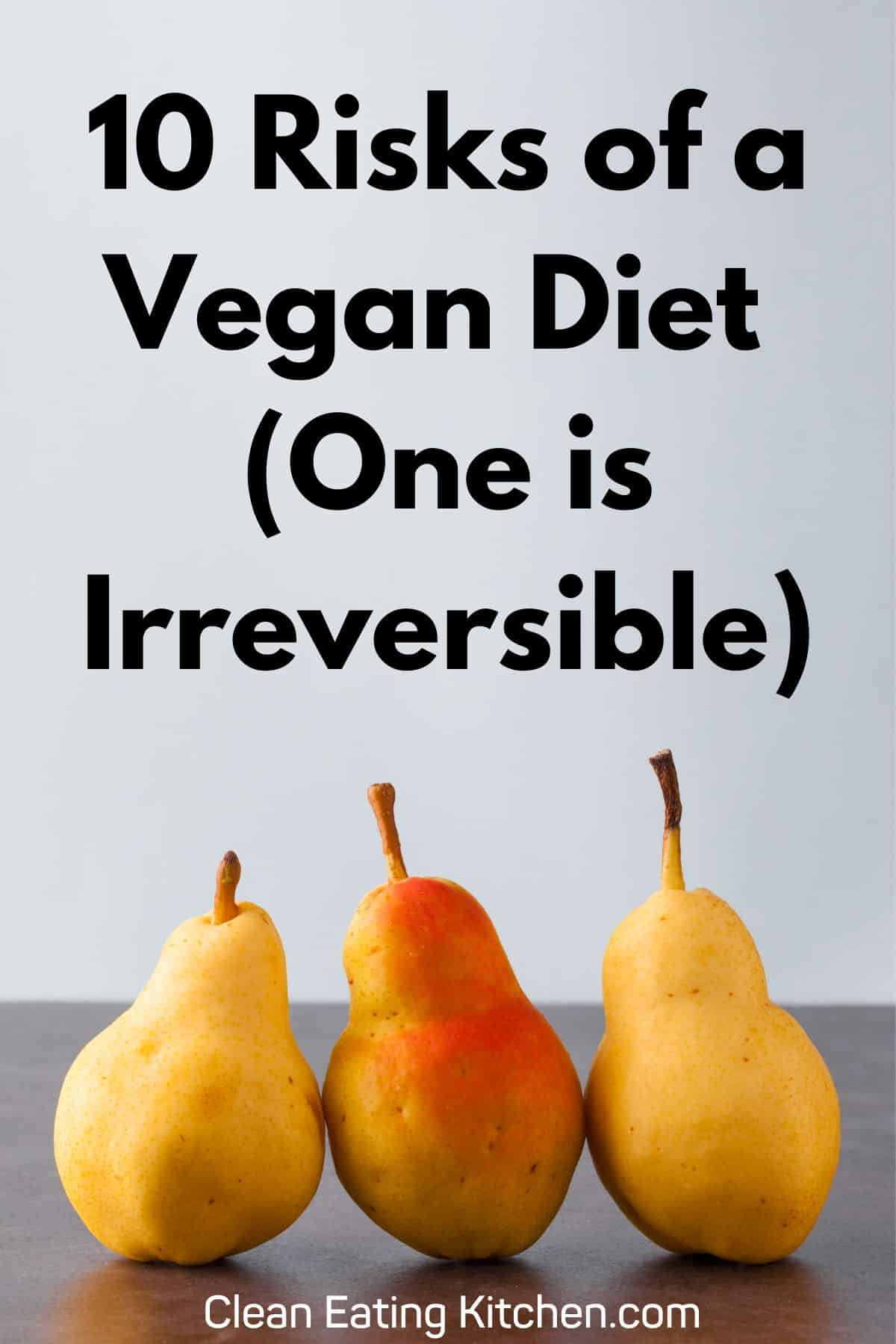
Have you ever wondered if a vegan or plant-based diet would help you manage your weight and resolve any nagging health problems? That’s the promise that is often made around this trend.
But, you hear less about the health problems that can occur from a strict plant-based diet that excludes all animal products. This article includes ten reasons that may dispel the myth that veganism is the healthiest diet and works for everyone.
I’ve also included some suggestions for how to counter these potential health risks of a vegan diet.
What Is a Vegan Diet?
What is a vegan diet? Simple put, a vegan diet is one that excludes any food that comes from an animal. This includes eggs, dairy, meat, fish, poultry, and even honey.
Some people take a vegan diet even further and embrace it as a lifestyle, and will not purchase or use any clothing or personal care products that include animal-based ingredients.
Whole foods, plant-based diets
A “whole foods, plant-based diet” is more often the term used for an approach that includes fewer processed foods, and a greater emphasis on fruits, vegetables, legumes, grains, nuts, and seeds.
However, even that term can get confusing as paleo diets are considered to be a plant-based approach, but they do include animal products.
Learn more about the differences between clean eating, paleo, vegan, keto, and Whole30 diets or the differences between vegan and vegetarians.

What vegans eat
If a vegan or plant-based diet does not include any animal products, then what does it include?
Vegans can eat vegetables, fruits, whole grains, soy, legumes (beans), nuts, and seeds.
A vegan diet doesn’t necessarily means it’s healthy, though, since it by definition does not exclude a lot of processed foods, sugar, or gluten.
Just look at the popularity of fake meats which are incredibly processed and not necessarily healthy by any stretch of the imagination. See my related article on the potential dangers of plant-based meats.
The healthiest vegan diet is likely a plant-based diet that also is one of the best diets for climate change.
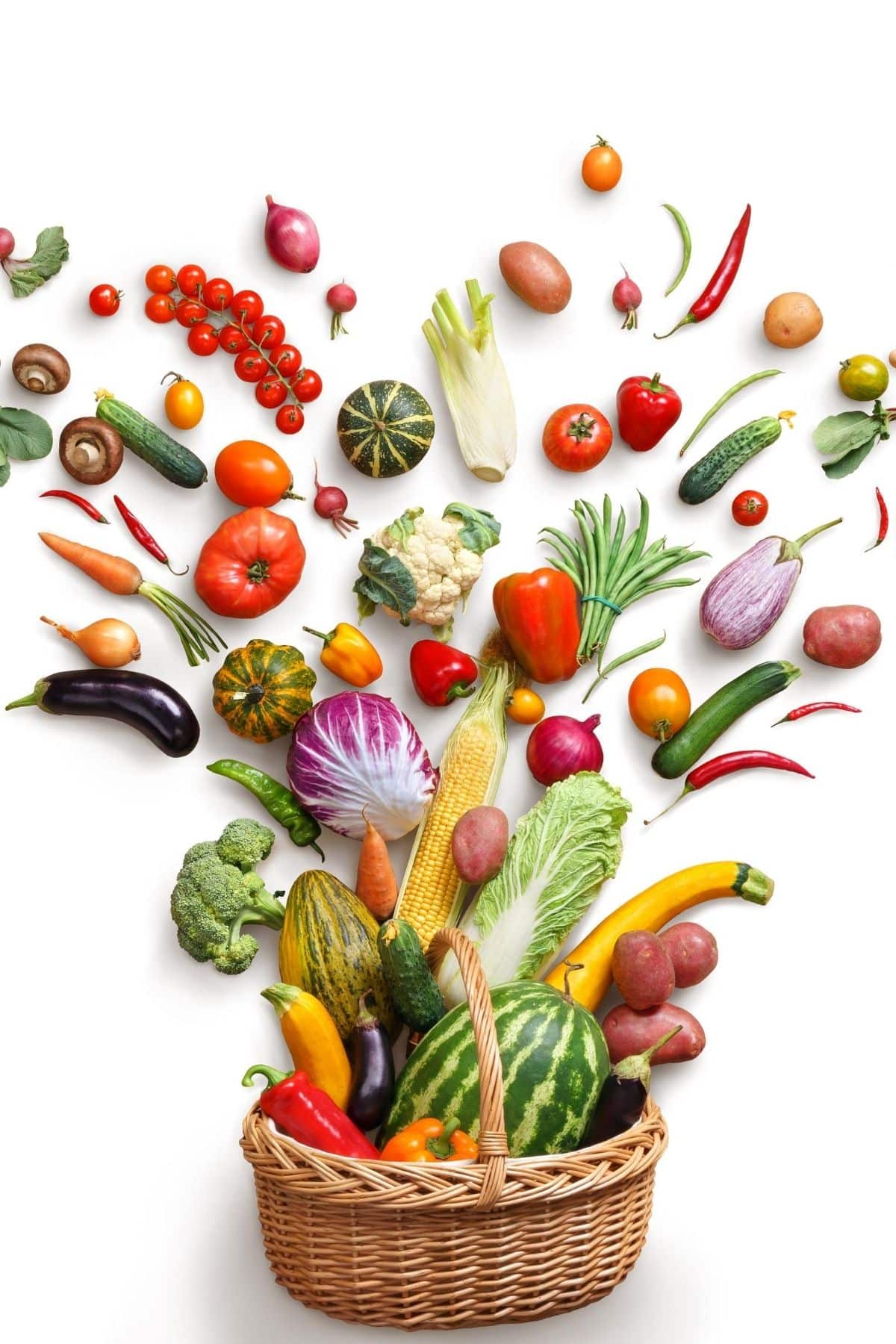
A vegan diet is an extreme diet
Although some people may thrive on a vegan or plant-based diet, it should be noted that it is considered an extreme diet because of how many foods it excludes, as well as the potential for nutritional deficiencies.
This article includes ten real problems with a plant-based diet, including my experience as a woman whose health declined as a result of being on a strict vegan diet.
If you are 100% committed to eating a vegan diet but you are always feeling tired, you might also want to read my article with tips for how to reverse fatigue on a vegan diet.
This article includes links to scientific studies whenever possible.
However, some of these potential diet dangers are anecdotal and not based on human studies. So, as always, it’s important that you consult your healthcare provider to help determine what type of diet is best for you.
Ten Potential Vegan Diet Dangers
Please note, my intent with this article is not to discredit any of the benefits that can result from eating more plant foods, but to provide cautionary evidence of what can happen if a vegan diet is taken too far and warning signs are ignored.
1. Risk of anemia due to a lack of heme iron
Iron-deficient anemia is the most common nutritional deficiency in the world, and both vegans and vegetarians are at higher risk of this condition.
While plant foods contain a form of iron, it is called non-heme iron and it is much less absorbable by the body.
Iron-deficient anemia can lead to serious symptoms including fatigue, and women of child-bearing age should be aware of how a vegan or vegetarian diet can quickly lead to anemia.
See my related post on how to eat to support your menstrual cycle.
While iron supplements can be taken to help reverse or prevent anemia, most women dislike taking iron supplements because potential negative side effects including constipation. It can also be difficult to take enough iron supplements to overcome anemia, especially without eating animal sources of iron.
See my list of the best vitamins for women over 30 or the best vitamins for a teenage girl which include iron to help boost ferritin levels.
You may also want to consider adding cricket protein to your diet. While eating insects is not normally accepted in a vegan diet, it may be a lower-impact way of adding animal protein back into your diet without eating animals like cows, fish, or chicken.
Having your ferritin levels checked regularly if you are a woman of child-bearing age is essential to ensure you don’t become anemic on a plant-based diet. See my article on how to order lab tests without a doctor.
You may also want to consider cooking with a cast iron pan (see my list of the safest cookware material).
Eating therapeutic meat
If you cannot raise your iron levels on a plant-based diet and you are at your wits end, you may consider something called eating “therapeutic meat.” The idea is that you eat just enough meat to raise your iron levels and then go back to a non-meat lifestyle.
This is a practice that is becoming more popular and may be something to consider. It is similar to getting a religious exception to eat certain foods not usually allowed in that religion unless you are sick or elderly.

2. Increased risk of depression with low omega-3 fatty acid intake
Without a food source of omega-3 fatty acids from fish or fish oils and an increased consumption of omega-6 fatty acid from foods like nuts, vegans might be at higher risk from depression.
Algae-based sources of omega-3 fatty acids are an option, but they can be expensive and hard to find. And, since many vegan diets may include a higher than average intake of nuts, the balance of fatty acids in the body can still get off-balance.
There are issues associated with low omega-3 levels and some are quite serious. Pregnant women also need to be extremely aware of their omega-3 intake as the fatty acids help nourish the fetal brain development.
Omega-3 fatty acids can be tested through a blood test, and should be monitored if you start experiencing symptoms of depression or anxiety. Please do contact a healthcare professional as soon as you think you might be depressed, as you don’t want the symptoms to get worse.
Once you have your levels tested, you can use algae-based omega-3 supplements to help increase your levels. In the worst case scenarios, you can consider taking a fish oil supplement to get your levels stabilized.
You may also want to consider the best magnesium supplements to help with anxiety.

3. Risk of Vitamin B12 deficiency
Since vitamin B12 is only available in animal foods, vegans are at a much higher risk of developing a deficiency in this vital nutrient.
In fact, most nutrition professionals agree that those on a vegan or vegetarian diet must supplement with a high-quality vitamin B12 supplement to avoid irreversible health conditions that can result from deficiency.
It should also be noted that many people have a genetic variation known as MTHFR that can impact how B vitamins are absorbed. In this case, even certain B vitamin supplementation might not be enough to prevent a deficiency.
Read more about the best MTHFR diet and supplements.
If you are at all concerned that you aren’t getting enough vitamin B12 in your diet, then ask your doctor for a vitamin B12 test.
If it turns out you are low in vitamin B12, then you may need to get an injection or use sublingual supplements, plus have your levels monitored regularly.
You may also need to monitor your intake of vitamin B2 (riboflavin) and vitamin B3 (niacin), as these can also be lower on a vegan diet.

4. Inhibition of zinc absorption on vegan and vegetarian diets
Similarly to deficiencies that can occur with vitamin B12, vegan and vegetarian diets can result in low zinc status.
It is theorized that the problem in this case is that higher consumption of plant foods containing phytic acid may inhibit the ability of the body to absorb zinc.
Because of this potential issue with zinc absorption, it is often recommended by nutrition professionals that vegans and vegetarians should increase their intake of zinc up to 50% of the recommended daily allowance to ensure adequate levels.
Good zinc levels are really important for boosting the immune system so it’s important to make sure you’re eating enough food sources of zinc or that you take a zinc supplement.
Plant-based sources of zinc are not as bioavailable as animal sources, so make sure you are getting enough from food sources or from supplements. Be careful with zinc, though, as you don’t want to take too much.

5. Low intake of iodine
Without quality sources of seafood, there is a real risk of not getting enough iodine in both vegan and vegetarian diets.
Iodine deficiency is problematic and can lead to hypothyroidism and other complications.
Vegans and vegetarians can supplement with iodine by using iodized salt or eating seaweed products. But, deficiencies still persist.
6. Not consuming enough calcium
Another nutrient deficiency that can occur with dairy-free, vegan, and plant-based diets is calcium deficiency.
While you can get calcium from plant-based foods, there is generally less calcium than in dairy products. And, plant foods often contain phytates and oxalates than inhibit the absorption of calcium.
A long-term risk of inadequate calcium intake is an increased risk of bone fractures.
If you cannot or do not want to consume dairy products, be sure you are taking a calcium supplement or consuming fortified plant-based milks.
7. Risk of consuming too much carbohydrate
Vegan diets are generally lower in protein and can cause blood sugar swings in certain individuals. There is also the risk of over-consuming carbohydrates on a vegan diet, especially since legumes are often consumed as a protein source, but are very high in carbohydrates.
Vegans may also replace the calories from protein sources with refined carbohydrates including bread, crackers, and cookies.
Over-consuming carbohydrates can lead to non-alchoholic fatty liver disease, blood sugar disregulation, and other troublesome symptoms. See my articles on how to follow a sugar-free diet and how to do a sugar detox.
You may also need to consider eating more complex carbohydrates like sweet potatoes as opposed to eating simple carbohydrates like crackers or bread.
You may also want to check out this article on the best gluten-free carbohydrates if you are unsure about which ones you should be eating.
8. Not eating enough high-quality protein
Eating a diet that includes moderate to higher levels of protein has been shown to have a positive effect on satiety and weight management. It can be harder to find quality sources of protein on a vegan diet that aren’t also carbohydrate sources (like beans) or are soy-based.
Without a quality source of lean protein in the diet, vegans may experience fatigue or low exercise tolerance. If that is the case, you may need to consider adding protein powder to your diet.
See my list of the best clean protein powders.
One risk of not eating enough protein is sarcopenia, or muscle wasting. This may be particularly true for older adults who are on vegan diets.
9. Risk of disordered eating
Orthorexia is a type of eating disorder that is defined by an over-fixation on healthy eating patterns. It can result in over-restriction, obsession, and other serious eating disorders.
At least one study found that vegans and vegetarians tended to display more orthorexic eating patterns, and most eating disorder specialists do not recommend restrictive diets such as veganism or vegetarianism for people trying to recover from an eating disorder such as orthorexia.
Read more about orthorexia and food obsession.
If you find that your eating disorder is getting worse on a vegan or plant-based diet, then you should consider working with a qualified therapist to help work on increasing your body weight.
In the worst case scenario, your therapist may advise you to consider moving away from a vegan diet while you repair your relationship with food.
You may also need to consider eating more calorie-dense foods if you are recovering from an eating disorder. See my 1,000 Calorie Weight Gain Smoothie or my list of the best Weight Gain Smoothies for recipe inspiration.

10. Processed soy issues
Again, as a result of excluding all forms of animal protein, many vegans turn to soy as a protein source.
While unprocessed forms of soy may be okay for some people, processed forms of soy are commonly found in a vegan diet, including tofu, soy milk, and soy-based processed foods sold as meat substitutes.
Processed soy foods are no better for human health than any other highly-processed foods, but with the added risk of hormone interference due to phytoestrogens found in all forms of soy.
Soy has also been found to be a contributor to the intake of the toxic metal cadmium in vegans and vegetarians.
Read more about the potential dangers of eating soy.
To help counteract or avoid any negative results from eating too much soy, you may consider eating fermented soy sources such as tempeh, or limiting your soy consumption to several times a week. You may also wish to avoid non-organic forms of soy which can be a source of GMOs in the diet.
If you do choose to consume soy, try making healthy recipe as opposed to buying processed versions. I recommend my Air Fryer Tofu as a great option.

Additional health risks associated with veganism
While some of the health risks of a vegan diet are outlined above, this list is not complete.
There are other risks of a plant-based diet including becoming isolated from friends and family due to an extremely restricted diet, the risk of eating too many high histamine foods and developing histamine intolerance, the risk of triggering a gluten intolerance when consuming too many gluten-containing foods, and other risks including inadequate intake of vitamin D.
The bottom line is that a vegan diet is not natural for humans and most cannot stick with it (up to 84% of vegans and vegetarians end up eating meat again).
While it can be used on a short-term basis for weight loss or for other health reasons, it may result in significant nutritional deficiencies over the long term as well as other risks including eating disorders and isolation.
This is especially true if a vegan is not taking supplements and is not being closely monitored by a healthcare professional with regular blood work.
Signs of an Unhealthy Vegan Diet
An unhealthy vegan diet, like any poorly planned diet, can lead to various nutritional deficiencies and health issues such as the ones mentioned above.
Still, you may not know if your vegan diet is letting you down until you start experiencing symptoms or signs of deficiency. Here are some signs that a vegan might not be getting a balanced diet:
- Fatigue and Weakness: This can be a sign of iron deficiency anemia, common in those not consuming enough iron-rich plant foods or vitamin C, which enhances iron absorption.
- Poor Skin Health: Dry, pale, or bruised skin might indicate deficiencies in vitamins and minerals like vitamin A, vitamin C, and zinc.
- Hair Loss and Brittle Nails: This can result from inadequate protein intake or deficiencies in vitamins and minerals like iron, zinc, and vitamin B12.
- Dental Issues: Problems like bleeding gums can be a sign of vitamin C deficiency, while weak enamel might indicate a lack of vitamin D.
- Digestive Problems: Persistent digestive issues may be due to a lack of dietary fiber, often found in fruits, vegetables, and whole grains, or from overconsumption of processed vegan foods low in fiber.
- Mood Changes and Cognitive Problems: Deficiencies in omega-3 fatty acids, vitamin B12, and iron can affect mental health, leading to issues like depression, anxiety, or difficulty concentrating.
- Frequent Illnesses or Slow Healing: This might indicate a weak immune system, possibly due to deficiencies in essential nutrients like zinc, vitamin C, and vitamin D.
- Unintended Weight Changes: Sudden weight loss might result from not consuming enough calories, while weight gain might occur from over-reliance on processed vegan foods high in sugar and fat.
- Bone or Joint Pain: This could indicate a deficiency in vitamin D or calcium, both crucial for bone health.
- Irregular Menstrual Cycles in Women: This can be caused by low body weight, high physical stress, or insufficient intake of essential fats and other nutrients.
It’s important to note that these symptoms can be caused by a variety of factors and may not necessarily be due to diet alone. A well-planned vegan diet can be healthy and nutritious, but it requires careful planning to ensure all nutritional needs are met.
I highly recommend consulting with a functional medicine practitioner who can help do the necessary lab testing and analysis to figure out the individualized diet appropriate for your needs.
My Experience
Most of you know me as creator of the Clean Eating Kitchen website.
I have a master’s degree in public health with a specialty in nutrition, but I’m also a woman on a healing journey, looking to find more natural and holistic ways to feel better and recover from health issues resulting from decades of eating a Standard America Diet (you can read more about me).
My introduction to veganism
Back in 2010, I had a friend who had gone on a vegan diet because she no longer wanted to eat animals (usually referred to as an ethical vegan). This was my first exposure to a vegan diet.
I then saw Oprah interview Alicia Silverstone about her book The Kind Diet and was even more curious about the purported health benefits of going vegan.
I got a copy of the book and was smitten with the idea that cutting out animal foods could potentially fix all the health problems that I was having, especially the inability to manage my weight that I learned years later was a result of undiagnosed thyroid disease.
My experience being vegan and then moving away from veganism
The first year on a vegan diet was okay. I had a hard time giving up some of my favorite foods, especially dairy yogurt and eggs. I didn’t lose any weight going vegan, but I had reduced acne outbreaks once I stopped eating dairy (I am still dairy-free).
About one year into my vegan diet experiment, I started experiencing an outbreak of hives after eating. The hives were intense. One morning my eyelid was swollen shut. I thought perhaps gluten might be the issue, so I also then cut out gluten (I am also still gluten-free).
Around that time, I also came across a more extreme version of veganism, one that cuts out all oils, processed foods, refined carbs, and sugar. I thought maybe, just maybe, that I had found the answer to losing weight and feeling good.
One thing led to another and I was eventually diagnosed with severe Hashimoto’s disease and then thyroid cancer in 2012. My world came crashing down. At the time, I had been following this extreme form of veganism for almost two years and thought I was supposed to be protected from such a terrible diagnosis.
I continued on the vegan path even after my diagnosis and treatment, thinking if I just tried harder or got more restrictive, then I would be healthy. My diet got more and more restricted and I felt an eating disorder mindset start to consume me. I was always hungry, yet I wouldn’t allow myself to eat the foods that would nourish and heal me.
Finally, after careful thought and lots of fretting, I decided to stop being vegan. I wrote a blog post about not being vegan anymore and lost a lot of friends over my decision (that blog post has over 500 comments on it).
Once I was immersed into the vegan culture, it made it that much more difficult to mentally make that mental shift of eating meat again. I experienced bullying and shaming when I wrote publicly about my decision.
Ultimately, I consulted with a dietitian, an eating disorder specialist, and functional medicine practitioners to recover my health and a balanced relationship with food.
At this point, I now have a much more balanced relationship with food, and I follow a clean eating diet full of real, whole foods. I eat a mostly gluten-free, dairy-free diet to manage my autoimmune conditions. I consume animal products, although I am very careful to try and choose wild, pasture-raised, organic, and local options whenever possible.
Overall, my energy levels are much more consistent and I don’t have the blood sugar swings that I had while I was eating a plant-based diet. My lab work shows that I have much higher levels of iron than I had while I was vegan, and overall I feel so much better.
FAQs About Vegan Health Risks
There are risks of nutritional deficiencies, as well as a risk of exacerbating or initiation of disordered eating patterns. Please contact your healthcare provider to determine which is the best diet plan for you, and how you may adapt a plant-based diet to best meet your individual needs.
There are certainly healthy aspects of a vegan or plant-based diet, as long as you are aware of the potential risks. And, as with any diet plan, if you determine it is not meeting your needs, you have the right to change your mind.
It all depends on the individual. But, there are enough significant risks on a vegan diet that you may want to consult with your healthcare provider to determine which diet is best for you.
It is also worth noting that you are allowed to try a vegan diet and you are also allowed to not eat a vegan diet. Your health and well-being is more important than sticking to a set of rules created by someone else.
Problems with a plant-based diet are similar or the same as the problems with a vegan diet. The bottom line is that both vegan and plant-based diets are very restrictive and may create problems over time, including nutrient deficiencies and restricted eating patterns.
Conclusions
Certainly, not everyone has a negative experience on a vegan diet.
There are plenty of people who would benefit great from adopting certain aspects of veganism, including incorporating more vegetables into the diet, and understanding the importance of not purchasing or consuming factory-raised meat.
See my clean eating food list for inspiration and a guide. You might also like this article on the best multivitamin for a women in 30s.
I eat a lot of vegan foods and still create a lot of vegan recipes, especially since I’m gluten-free and dairy-free to manage my autoimmune-related inflammation. I try to eat a variety of plant foods, while including animal protein with most of my meals.
The bottom line is that it’s important to be aware of the risks of extreme diets and any quick-fix approach to health. Based on my experience and exposure to the scientific literature on nutrition, a balanced diet including varying ratios of all of the macronutrients, will most often provide long-term benefits and a reduction of risk of nutritional deficiencies.
Please feel free to leave thoughtful comments that add to the conversation. If you’re looking to bash me for my dietary choices, then don’t waste your time. See my comment policy if you don’t see your comment published.
If you are upset about the plight of factory farm animals, then know that I am concerned about that as well. If you have ideas about how to educate the general public about choosing better sources of food, then I would be very curious to know how we can do that together.
Read Next: Tips on How to Reintroduce Meat After Being Vegan or Vegetarian
More Articles About Veganism & Diet You Might Like
References
- James H. O’Keefe, Evan L. O’Keefe, Carl J. Lavie, Loren Cordain, Debunking the vegan myth: The case for a plant-forward omnivorous whole-foods diet, Progress in Cardiovascular Diseases, Volume 74, 2022, Pages 2-8. https://www.sciencedirect.com/science/article/abs/pii/S0033062022000834
- Freed DLJ. Do dietary lectins cause disease? : The evidence is suggestive—and raises interesting possibilities for treatment. BMJ : British Medical Journal. 1999;318(7190):1023-1024 https://www.ncbi.nlm.nih.gov/pmc/articles/PMC1115436/
- Rizzo G, Baroni L. Soy, Soy Foods and Their Role in Vegetarian Diets. Nutrients. 2018;10(1):43. doi:10.3390/nu10010043. https://www.ncbi.nlm.nih.gov/pmc/articles/PMC5793271/
- Hibbeln JR, Northstone K, Evans J, Golding J. Vegetarian diets and depressive symptoms among men. J Affect Disord. 2018 Jan 1;225:13-17. doi: 10.1016/j.jad.2017.07.051. Epub 2017 Jul 28. PubMed PMID: 28777971. https://www.sciencedirect.com/science/article/pii/S0165032716323916
- Pawlak R, Parrott SJ, Raj S, Cullum-Dugan D, Lucus D. How prevalent is vitamin B(12) deficiency among vegetarians? Nutr Rev. 2013 Feb;71(2):110-7. doi: 10.1111/nure.12001. Epub 2013 Jan 2. Review. PubMed PMID: 23356638. https://www.ncbi.nlm.nih.gov/pubmed/23356638/
- Foster M, Chu A, Petocz P, Samman S. Effect of vegetarian diets on zinc status: a systematic review and meta-analysis of studies in humans. J Sci Food Agric. 2013 Aug 15;93(10):2362-71. doi: 10.1002/jsfa.6179. Epub 2013 May 29. Review. PubMed PMID: 23595983. https://www.ncbi.nlm.nih.gov/pubmed/23595983
- Westerterp-Plantenga MS, Lemmens SG, Westerterp KR. Dietary protein – its role in satiety, energetics, weight loss and health. Br J Nutr. 2012 Aug;108 Suppl 2:S105-12. doi: 10.1017/S0007114512002589. Review. PubMed PMID: 23107521. https://www.ncbi.nlm.nih.gov/pubmed/23107521
- Barthels F, Meyer F, Pietrowsky R. Orthorexic and restrained eating behaviour in vegans, vegetarians, and individuals on a diet. Eat Weight Disord. 2018 Apr;23(2):159-166. doi: 10.1007/s40519-018-0479-0. Epub 2018 Feb 3. PubMed PMID: 29397564. https://www.ncbi.nlm.nih.gov/pubmed/29397564.
- Dagnelie PC. [Nutrition and health–potential health benefits and risks of vegetarianism and limited consumption of meat in the Netherlands]. Ned Tijdschr Geneeskd. 2003 Jul 5;147(27):1308-13. Review. Dutch. PubMed PMID: 12868158. https://www.ncbi.nlm.nih.gov/pubmed/12868158
- Key TJ, Appleby PN, Rosell MS. Health effects of vegetarian and vegan diets. Proc Nutr Soc. 2006 Feb;65(1):35-41. Review. PubMed PMID: 16441942.
- Simpson JL, Bailey LB, Pietrzik K, Shane B, Holzgreve W. Micronutrients and women of reproductive potential: required dietary intake and consequences of dietary deficiency or excess. Part I–Folate, Vitamin B12, Vitamin B6. J Matern Fetal Neonatal Med. 2010 Dec;23(12):1323-43. doi: 10.3109/14767051003678234. Epub 2010 Apr 7. Review. PubMed PMID: 20373888. https://www.tandfonline.com/doi/abs/10.3109/14767051003678234?journalCode=ijmf20
Don’t forget to join my newsletter list to get exclusive clean eating recipes and tips. The newsletter is 100% free with no spam; unsubscribe anytime.
About the Author: Carrie Forrest has a master’s degree in public health with a specialty in nutrition and is studying to be a holistic nutritionist. She is a top wellness and food blogger with over 5 million annual visitors to her site. Carrie has an incredible story of recovery from chronic illness and is passionate about helping other women transform their health. Send her a message through her contact form.
Note: this post is for informational purposes only and is not intended as medical advice. Please consult your healthcare provider for recommendations related to your individual situation.



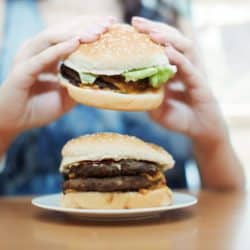
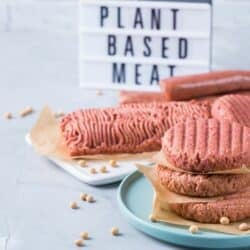




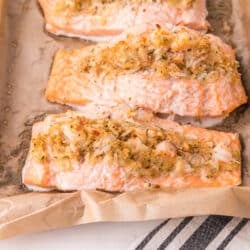




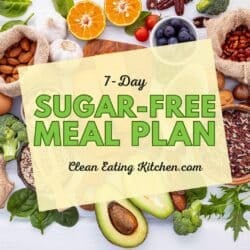






I think many of your comments are subjectively floored! Like any diet a vegan diet should be managed. A lot of what you are saying , such as oestrogen in soya is not discussed in depth about the types and developments of oestrogen in food. Balances of B12 have shown significant Deficiencies in meat eaters as well as vegans. Many animals now have to be given B12 supplements themselves. You mention carbohydrates, but these are a significant problem throughout world wide diet consumption as obesity levels rise with a significant impact upon those being carbohydrates. The problems many people have even on vegan diets is that some can still eat an unhealthy diet with the increase of vegan junk food, which could be a worry. This is a worry in light with the increasing consumption of non vegan junk and processed food, in particular meat based. Every one of the above eight statements can be counteracted with alternative statements and reach about the vegan diet. What has not been mentioned is the ratio of vegans or plant based who thrive on a vegan diet and and compare the same health issues to those that consume meat and animal products!
Many reasons could give significantly more reasons on the positive aspects of a vegan diet in comparison to animal based products. Besides to many vegans the moral element is the most important issues and argument. This just covers comparisons related to health high are arguably can be countered. If you are in line to eat or consume animal products for your health then you are not truly vegan but we’re plant basedThere is a lot of playing towards the vegan diet by those who feel it’s a diet health fad rather than a moral life style!
I appreciate some of the comments you make but perhaps this article could have been balanced out?
Hi Carrie!!
awesome article! would it some how be possible to email with you? I’m currently considering switching to veganism (slowly, and working through it) as i’m considering the upside potentials for physical performance. i have heard heaps, and read a lot of articles explaining the uplift in performance whether weights/aerobics etc, as well as the increase in energy in general. i also know the problem with animal based products being the reaction with bacteria in the stomach, causing restriction in the blood vessels. would you have any hints or tips beyond this article that might help me avoid potential pitfalls.
My desire for all of this is to see what sort of differences could come from veganism, as i have quite the knowledge on a mixed diet, so exploring this is incredibly fascinating to me.
I definitely dont think i will completely cut out meats, as they are foundational to my dieting, but would be looking to restrict the intakes to a once a week, just simply from the above mentioned potential performance benefits.
Regards,
Alec
Hi Alec, I don’t do nutritional counseling, but there are lots of nutritionists who I’m sure would be happy to help you. My advice would be to consult with someone in the paleo or functional medicine space who would have the most current knowledge. You might also check out the Revolution Health podcast with Chris Kresser who just debunked the idea that veganism is better for physical performance. I hope this helps!
Been vegan (along with my husband) 20 years, healthier than literally ALL of my friends. The vegan diet is not only the best for the animals and the planet, but it is the best nourishment for the human body.
That’s great, Lily! I’m so glad you are thriving! I think most people would benefit from eating more plant-based, but more people cannot thrive on 100% plant-based. If we could get more people eating their veggies, I think we would be a healthier society. I disagree that a vegan diet is the best diet, though. We evolved as a species to eat animals, that is just the plain and simple truth.
Lily, i would encourage you to read about anti-nutrients, and fat. With a vegan diet, you undoubtedly will eat too many anti-nutrients, and very low fat, and that is a recipe for tooth decay. The teeth are a good indicator of your overall health. Also, pastured, farm raised animals is where it’s at, if your concern is what’s best for the animals, and the planet. i wish you luck, and good health.
My daughter had severe depression and anxiety all through middle and high school years. She ate an omnivorous diet w plenty of dairy sources. No meds or therapy seemed to help. She decided to go vegetarian and then vegan. Her low energy and depression began to wane. With her increased energy, she began to exercise more and see the light at the end of the tunnel. She has been vegan 8 years now and is thriving. We watched earthlings and read The China Study then transitioned to a plant based diet as well. We take a vegan vitamin, b12, and I cook healthy plant based meals. We snack on nuts, raisins and seeds. We eat very little processed vegan products and use chia and flax and dark greens like kale and spinach in smoothies to supplement for additional benefits. My arthritis in my hands and feet has disappeared and my energy level remains great. I am very active, work full time, go to the gym and hike. I have not seen any negative side effects from going vegan and my blood work shows great results. My blood pressure is low normal, no cholesterol problems and no B 12 problems. For my family, a compassionate vegan diet is the way to go. My dad and his wife are both suffering heart issues w their typical omnivorous diets. Both have had heart surgeries for blockages, are overweight and not very mobile. My mother also has had open heart surgery resulting in a mini stroke and vertigo issues. Arteries filled w plaque from fatty meats and dairy are disturbed during surgery and stroke is common. My mother in law, on the other hand, eats primarily plant based and is a dynamo at 85 still Works and is out hiking.
Your page has Keto food delivery advertisements which makes me doubt your authenticity BTW.
I’m so happy that you and your family are doing well, Donna! Sadly, I mostly get stories of the opposite. Of course, eating more plants is generally a healthier way to live. But, not everyone does well on a 100% plant-based diet. We evolved to eat meat. But, again, everyone is different! As far as the ads on my site, I don’t have a lot of control over that. I’m in an ad network which is the only way I can continue to keep blogging. Thanks.
Yes I am NOT vegan in anyway shape or form.
I am a firm believer that the amount of protein you need is based upon- heritage, and lifestyle (sports).
But I am interested in your first con you have listed- Causes Leaky Gut.
My family raised and grow as much as we can and whatever we can not produce we buy from local farmers. Or at least keep it grass fed and certified organic.
Doing this we practice heavily towards the practicing methods of Weston A Price foundation. Except we avoid 99% of the time gluten. Only when we make Sourdoughs with the special original wheat strain do we eat gluten.
We sprout all our grains and legumes. So with this practice would you say the leaky gut is not a concern for us? As I understand all the things you listed that causes the leakage is broken down by sprouting .
Also out children have eaten this way from birth. Naturally they are kids so they stomach virus’s time to time. But they are not vaccinated and we use homeopathic remedies for medicine instead of drugs. And we don’t get ?
If you are soaking and sprouting then you are doing all the right things!
Some interesting comments. Personally I try to avoid all processed foods but do eat some meat and dairy. If you haven’t already seen it watch The Game Changers on Netflix. Some interesting research.
Yes, I had a similar experience! The more restrictive my diet, the more health problems I experienced. Now, I listen to my body… I eat lots of home grown organic fruits and vegetables and some grass fed meat & fermented dairy. I eat with the seasons and mostly local. If we learn to listen to our bodies, we will be guided. May we all listen moment by moment and thrive!
my glorious granddaughter who was a ball of energy, happy and successful in high school, and her 1st year of college suddenly decided to go full plant based diet. in two years she has become lethargic, sad, and barely hanging on in her 3rd yr. there is no talking to her. she is on anti-depressants. her parents are “supportive”, and chalking her worsening condition up to her boyfriend graduating in May. I am so afraid for her. what can I do??
I am so sorry to hear this, Kawanna. I think she needs to see an eating disorders specialist or a professional therapist. I would also highly recommend a functional medicine practitioner who can figure out how to replenish her nutrients and get her back on the right track. This must be horrible for you to watch, I am so sorry to hear about this.
Thank you for sharing your article:). I’ve been vegan for about 3 months now and 16 years old. I started to decrease the amount of vegan junk food and the amount of oil, but recently I have been started to feel some type of pain all over my body. I have also been realizing some brown mark on my body. They look like age marks but some straight up look like a birthmark. I also have about 5 cherry agnoma (not sure if i spelled that right but basically red spots)Because of these reasons, I have started to become quite concerned. When I went to my doctors for a checkup, I was just deficient in D3 but that was a like a month ago. I will admit that I was suppose to pick up my vitamin D3 supplements the same day I was received the news. So this is my second day taking D3. Hopefully, it’ll solve the problem but if not i’m going to have to do more research or see a doctor.
Hi Jake, are the spots itchy at all? Are you taking a probiotic? I would try to see a functional medicine practitioner as soon as possible who can help determine the root cause.
by the way just in case you guys are wondering, Nimai Delgado is a full vegan, he was initially a vegetarian and has NEVER eaten any sort of meat in his life ever! Now he has cut out dairy as well as a vegan.
He is a vegan pro body builder.
a talk by him, if anyone is interested.
The strongest man in Germany as well is a vegan – Patrick Baboumian:
And so are many other athletes such as Dotsie Bausch, the oldest olympic athlete in her discipline to win, lewis hamilton, etc…
At the end of the day its how you balance your food intake and not just eat processed vegan food!
But there is also nothing wrong in eating meat to maintain your health if you are unable to get the right kinds of foods, which can be expensive at times.